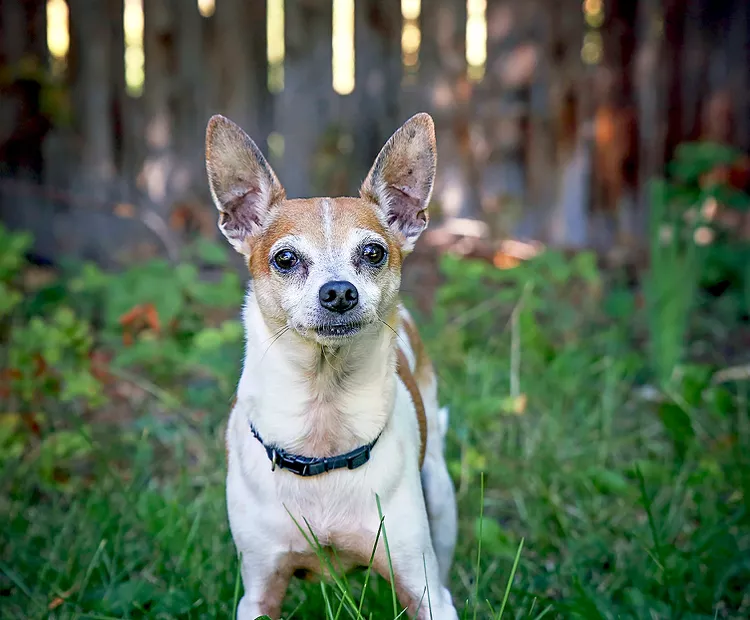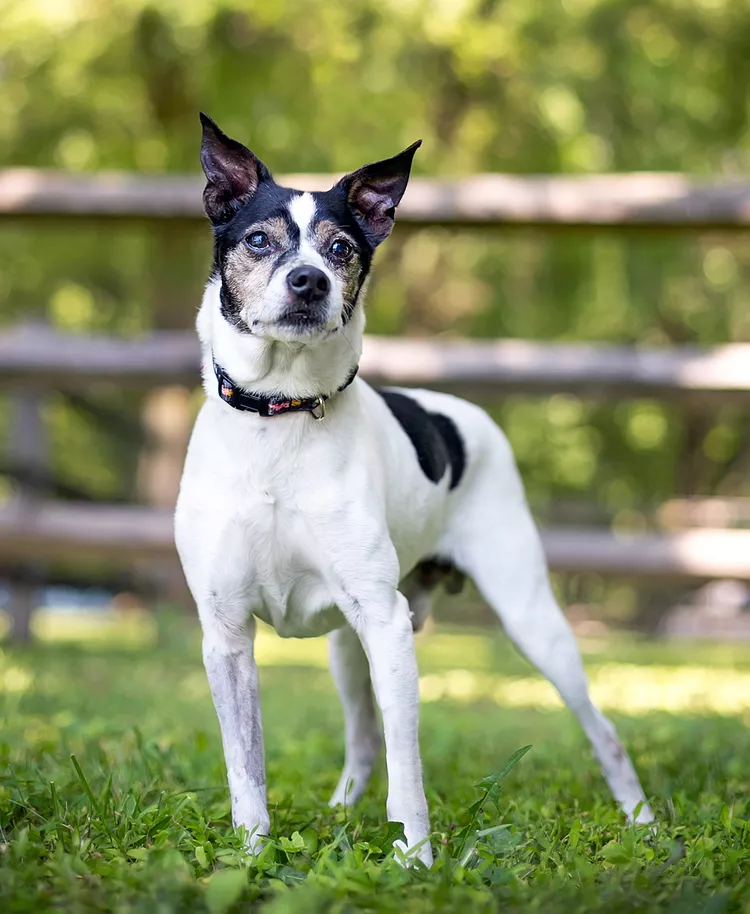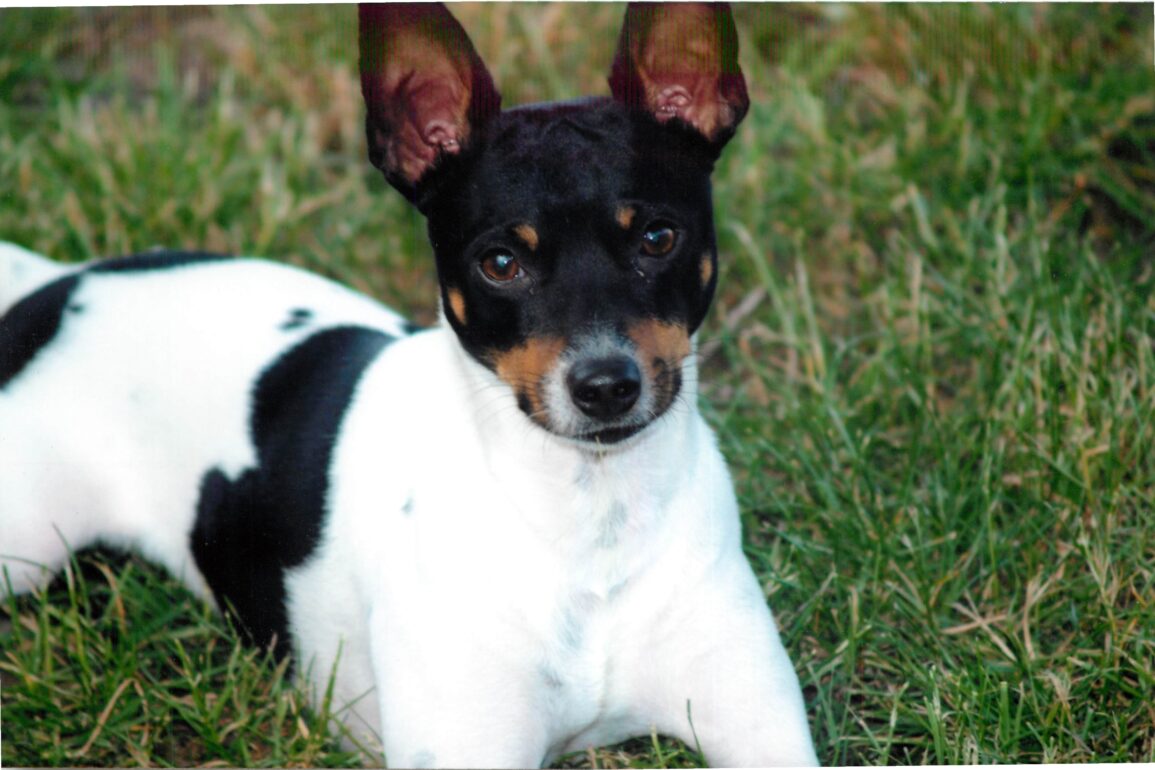Purebred Rat Terrier Dog Breed Information
The Rat Terrier, deeply rooted in American heritage, offers an intriguing look at the evolution of dog breeds. These dogs were initially bred to be multi-functional, adept at hunting pests and being loyal friends. Today, Rat Terriers are known for their intelligence, agility, and ability to adapt. Their sharp senses and manageable size have allowed them to thrive in roles ranging from working on farms to being beloved family pets. The breed’s history includes influences from various other breeds, creating a distinctive genetic mix worth examining.
Despite their lively nature and loving temperament, those interested in Rat Terriers should know the breed’s requirements. This article will discuss the Rat Terrier’s personality and the details of their care. It’s essential to recognize why Rat Terriers remain popular and consider the future of these vibrant dogs.
Key Takeaways
- Rat Terriers excel in intelligence and adaptability.
- They serve as both working dogs and family companions.
- Care for these dogs includes understanding their unique needs.
The Rat Terrier has a rich American history, blending various breeds for a unique genetic makeup. These dogs, once hunters, now shine in their versatility and intelligence. They’re small enough to manage yet keenly aware, fitting in on farms or homes. Knowing their specific care needs is vital for those considering a Rat Terrier. As society moves forward, Rat Terriers charm owners with energy and affection.
Quick Facts
The Rat Terrier originated in the early 1900s in the United States. It’s a lively and versatile dog, officially recognized by the American Kennel Club in 2010. These dogs are small, weigh 10 and 25 pounds, and have an impressive lifespan of 12 to 18 years. Rat Terriers have a strong instinct to hunt, a trait that historically made them excellent at controlling pests.
Known for their intelligence and stubbornness, Rat Terriers need regular mental challenges to stay happy. This is especially true for the miniature variety, which is well-suited for various living situations, including small apartments.
Although generally healthy, Rat Terriers can be prone to genetic issues like patellar luxation and hip dysplasia. Despite this, they usually live long, healthy lives.
Rat Terrier Dog Breed Pictures






Overview
Having established the Rat Terrier’s historical context and primary characteristics, we now examine the breed’s broader attributes and adaptability as a companion and working dog.
The Rat Terrier Dog, acknowledged by the Terrier Club of America, epitomizes versatility with its compact, athletic build suited for various activities. Recognized for hunting small game, this breed exhibits an innate feistiness and spirited nature, vital for their traditional roles on farms.
Weighing between 10 to 25 pounds across three size variations, they are robust and generally healthy, though not impervious to genetic disorders. Intelligence and trainability are hallmarks of the breed, necessitating early socialization and consistent obedience training.
Adaptable to diverse family environments, they require distinct boundaries, regular physical activity, and dedicated attention to thrive as well-adjusted pets.
Key Traits of Rat Terriers

Rat Terriers are known for their compact strength and joyful nature, making them excellent pets and efficient hunters of pests. These dogs are hardy and typically enjoy good health, often avoiding the frequent health problems that plague other breeds, like patellar luxation.
These dogs are pretty intelligent and can learn a variety of tasks, but they need mental stimulation to match their high energy levels. Their flexibility in adjusting to different environments and affectionate demeanor makes them suitable for families. Rat Terriers come in miniature and standard sizes and are easy to take along on trips or outings.
| Size Varieties | Health | Temperament |
|---|---|---|
| Miniature | Hardy | Intelligent |
| Standard | Less prone to health issues | High-energy |
| Easy to carry | Lives about 15-18 years | Fun-loving |
| Watch for patellar luxation | Easy to train | |
| Checked by dog health groups | Great with families |
Rat Terrier History

The Rat Terrier breed originated from the farmlands of America in the early 1900s, serving as both a hunter of vermin and a friendly pet. Its evolution has been marked by significant events that have solidified its appeal and practicality.
The breed’s increased popularity showcases its ability to adapt and inherit various characteristics from its mixed heritage. European terriers were crossed with American dogs to create a more capable hunter. This mix aimed to bring out the best characteristics, such as determination, smarts, and flexibility, which have been crucial in the Rat Terrier’s growth.
During the 1920s and 1930s, the Rat Terrier became more popular because of the growing need for effective pest control. Even though its popularity has seen ups and downs, the Rat Terrier remains a beloved choice in both countryside and city life, thanks to its easygoing personality and loving nature.
Early Breed Ancestry
The Rat Terrier’s origins can be traced back to when their primary role was to hunt pests and serve as dependable farm dogs. They share much of their early history with the Teddy Roosevelt Terrier, a breed that excelled in these areas. The Rat Terrier emerged from a mix that included the now-extinct English White Terrier, Fox Terriers, and other European terriers.
They were developed into solid and agile dogs in the United States, well-suited for hunting and controlling farm pests.
The breed’s development was significantly influenced by breeders such as Milton Decker in the 1920s and 1930s. His work was vital to enhancing the Rat Terrier’s traits, solidifying its status as a loyal working dog with a friendly nature.
This history is not just about a breed’s origin; it shows how specific traits were selected to meet the demands of farm life, resulting in the Rat Terrier we know today.
Evolutionary Milestones
Rat Terriers started as pest control experts, but they’ve grown into much more. These dogs are a mix of terrier, beagle, Italian Greyhound, and Manchester Terrier bloodlines. This blend has made them small, agile, and adept at controlling pests. Their coats come in many colors.
Being intelligent and easy to train, Rat Terriers excel in various tasks. However, they can be headstrong, so it is essential to keep them socially active and mentally challenged. They’re usually healthy, but they can have some inherited health issues.
Recognition by groups like the AKC and UKC shows just how valued Rat Terriers are in the world of dogs.
Breed Popularity Surge
The Rat Terrier has become increasingly popular due to its adaptability and intelligence. The breed offers two different sizes, making it attractive to various dog lovers.
The Rat Terrier has become an effective pest hunter and a loyal pet, recognized by major kennel clubs like the AKC and UKC in the later part of the 1900s. Its rise in the 1970s, as both a household and working dog, along with creating the smaller version, has broadened its fan base.
Stature and Build

The Rat Terrier is a dog breed known for its distinct appearance and practical capabilities. These dogs are crafted to balance strength and agility, making them suitable for various activities. They come in sizes ranging from the smaller miniatures to the more extensive standards. Their physical form, characterized by a robust bone structure, supports their dynamic athleticism. This makes them adept at activities that require quick movement and stability.
In terms of size, Rat Terriers are grouped into either miniature or standard varieties based on their height and weight. Their bodies are coated with dense, short fur and underscored by a muscular build. Their physical prowess is apparent in their quickness, skill, and stamina. The breed’s sturdy yet adaptable skeleton is a testament to their historical background as working dogs on farms and skilled hunters.
Average Height Range
Rat Terriers come in a compact and versatile size. The smaller versions, known as miniatures, typically measure between 10 and 13 inches tall. On the other hand, the standard Rat Terriers are a bit taller, with heights falling between 13 and 18 inches.
These dogs are part of the Terrier group, and their size is just right for city living and country environments. Their height makes them agile and perfect for a lifestyle with lots of activity, which is what Rat Terriers are known for.
The larger standard Rat Terriers, while only 13 to 18 inches in height, are surprisingly sturdy and can do many jobs with energy and enthusiasm. Due to their active nature, their owners need to provide them with plenty of exercise and mental stimulation to keep them healthy and happy.
Body Weight Parameters
Understanding the weight range of Rat Terriers is essential for their health. These dogs usually weigh between 10 and 25 pounds. Monitoring their weight is vital because of their small stature and variations, such as the standard and miniature sizes. Proper weight management helps avoid health problems like hip dysplasia.
Their compact and athletic build gives Rat Terriers agility. Keeping them at a healthy weight is critical, especially since they can live for 12 to 18 years. This is important for their longevity and ensures they thrive in apartments and different climates.
Typical Physical Features
Rat Terriers are known for their sturdy and durable build, perfect for pest control. These dogs come in two main sizes: the miniature Rat Terrier, which measures between 10 and 13 inches at the shoulder, and the standard Rat Terrier, which stands taller at 13 to 18 inches. Their muscular frame shows their agility and love for exercise, making them ideal for various activities.
These terriers are well-proportioned, ensuring they are as suited to life on a farm as they are in a small city apartment. Their size makes them easy to take along on trips, which is excellent for constantly moving people. Rat Terriers also have a range of coat colors that add to their attractiveness. They are known for their vigor and dedication to work, a hallmark of the breed.
Athleticism and Agility
Rat Terriers are known for their muscular build and impressive physical abilities. These dogs are incredibly agile, which makes them stand out in various dog sports. They thrive on agility trials, flyball, and obedience competitions, where their speed and quick reactions give them an edge.
It’s not just for fun – these dogs must stay active to burn off their high energy and keep their minds sharp.
Regular exercise and mental challenges are necessary to keep a Rat Terrier at their best. They also need to be socialized from an early age. These dogs are more than capable of handling intense physical tasks like hunting or farm work. Their endurance and strength make them natural for jobs and sports that terriers traditionally did.
Bone Structure Details
Rat Terriers are known for their solid and compact bodies. They are agile and muscular due to their bone structure. These dogs come in two sizes: miniature and standard. Both sizes are sturdy and well-suited for hunting and farm work, thanks to their quick reflexes and efficient movement.
Health Concerns in Rat Terriers
When it comes to health, Rat Terriers can inherit certain conditions. Their solid build might lead to knee issues, such as patellar luxation. Because they are so active, they might also face a higher chance of developing hip problems or CalvéPerthes disease. Heart problems are another concern within the breed. Responsible breeding is critical to reducing these health risks.
Rat Terrier Traits

Rat Terriers exhibit a range of behaviors influenced by their genetics and environment. Owners must manage their strong instinct to chase and their tendency to bark with consistent training and exercise. Early socialization is crucial for developing a stable temperament and preventing issues.
- Managing Prey Drive: Strategies for curbing their chasing instincts are necessary.
- Socialization: It’s vital to introduce them to various settings and creatures.
- Training Methods: Effective training uses clear, positive reinforcement.
- Exercise Needs: They need plenty of activities for physical and mental well-being.
Like many dogs, Rat Terriers have behaviors stemming from their breed’s history and upbringing. Structured training and plenty of exercises help control their instinct to chase and bark. Introducing them to different environments and animals early on is essential for a well-rounded dog and helps avoid future problems.
- Controlling Hunting Instincts: It teaches them to manage their natural tendencies.
- The Value of Socialization: Exposure to various scenarios is critical for their development.
- Positive Training: Consistency and rewards are the core of practical training.
- Keeping Them Active: A mix of physical and brain games keeps them sharp and satisfied.
Prey Drive Management
Managing a Rat Terrier’s strong prey drive is critical to keeping the peace with other small animals and ensuring their energy is used correctly. Since Rat Terriers were initially bred for hunting, they naturally want to chase, and owners need to be smart about training and socializing them from a young age.
Introducing them early to different animals and places can help curb the urge to chase. Using puzzle toys and planned activities can redirect their hunting instincts into playtime. That’s okay. Always watch Rat Terriers around smaller pets to prevent unwanted chasing.
Training that uses rewards to promote good behavior helps set clear rules. Tackling the prey drive in Rat Terriers takes time, effort, and consistent reinforcement of the behaviors you want to see.
Training, socialization, and supervision are the pillars of managing their instincts. Introduce your Rat Terrier to various animals and environments as soon as possible. This helps them learn not to chase everything that moves.
Engage them with brain games and exercises that make them think. This can turn their instincts into fun and harmless play. Always keep an eye on your Rat Terrier when they’re near smaller pets to prevent trouble.
Use treats and praise to teach them what’s acceptable. This builds good habits and helps them understand their limits. Being patient and consistent is essential in guiding Rat Terriers to behave well.
Socialization Importance
Training Rat Terriers to interact well starts with managing their natural hunting instincts. It’s critical to begin exposing them to different situations early on. This happens during a crucial time when they’re still puppies. Their experiences can change how they act around others later, preventing aggression or fear.
Regular socializing helps these dogs behave around kids and other animals. It also stops problems like too much barking or howling, which usually come from feeling anxious. Mixing obedience training with meeting new people and animals helps them adjust and stay calm. This also builds a friendly and stable personality. So, teaching Rat Terriers to socialize is essential for their overall behavior.
Keep their training clear and straightforward. Avoid complex terms and focus on what works. Explain the benefits of socializing, like fewer behavior problems and a happier pet. Use smooth transitions to connect ideas. Choose direct language that shows action. Stick to real-world examples and avoid exaggerating. Make sure to give specific advice when needed, like recommending particular training.
Write in your own words to maintain originality, and check your work for errors. Keep the tone friendly and persuasive. Use detailed descriptions in your writing. Use headings to organize the text and make it easy to understand.
Training Techniques
Proper training for Rat Terriers should start early to shape good manners and manage their boundless energy and hunting instincts. It’s crucial to use consistent, positive feedback during training. Rat Terriers respond well when their eagerness to please is used to motivate them.
However, they can be headstrong, so keep them interested with various mental challenges to satisfy their intellectual needs and prevent bad habits.
Addressing their tendency to bark and roam is also important. A well-thought-out plan that meets their exercise and mental requirements is essential for their happiness and ability to get along with others.
Exercise Requirements
Rat Terriers are a dog breed bursting with energy and thrive on a well-planned exercise regime. They require daily and lively activities to keep them physically and mentally sharp. Rat Terrier owners must establish a routine encompassing play, walking, and advanced exercises like agility to meet their dog’s needs.
These dogs also benefit from interactive toys and games, which help to keep their minds active and prevent negative behaviors such as excessive barking or anxiety.
Owners must ensure that exercise areas are secure because Rat Terriers are known to be quite the escape artists. A dependable exercise plan is vital in directing their energy positively and avoiding the issues that come with boredom.
Vocalization Tendencies
Rat Terriers are known for their loud barking and howling, which are their ways of communicating and staying alert. These pint-sized, lively pets have a keen instinct to hunt, which can cause them to sound off when they spot something exciting or feel threatened. Teaching them to behave and socialize while young is vital to controlling their barking. This training helps them distinguish between everyday sounds and those out of the ordinary, leading to better control over when they choose to bark.
Keeping a Rat Terrier’s mind busy and body active can also help reduce unnecessary noise. Because they’re such active dogs, they need plenty of things to do. If they’re engaged and exercised regularly, they’re less likely to bark just for the sake of it.
For families who bring a Rat Terrier into their home, teaching them how to bark less is beneficial. Using rewards and positive feedback works well to get them to listen to commands and bark only when appropriate.
Wellness and Longevity
A combination of genetic factors and proactive care influences the health and longevity of Rat Terriers. To maximize their lifespan, it is imperative to implement a regimen that encompasses both preventative health strategies and daily wellness practices. By addressing these critical points, owners can play a significant role in ensuring the vitality and longevity of their Rat Terrier companions.
- Health Maintenance Tips:
- Implement a regular exercise routine tailored to the breed’s energy level.
- Ensure a balanced diet that meets nutritional standards.
- Schedule routine veterinary visits for early detection of potential health issues.
- Maintain consistent dental hygiene practices to prevent common oral diseases.
Rat Terrier Health Maintenance Tips
Caring for Rat Terriers means providing regular exercise, mental challenges, and preventive healthcare. These dogs are prone to gaining weight due to their high energy, so daily activity is crucial. To keep their minds active, offer them engaging toys and puzzles.
Regular visits to the vet can catch and address health issues that are common in Rat Terriers. Good dental hygiene is essential; brush their teeth often and give them dental chews. A well-rounded diet that matches their age and energy level will help maintain their health.
Lifespan Maximizing Strategies
Focusing on overall health and wellness is critical for Rat Terriers to live their longest. Regular exercise and brain games help prevent behavioral issues and keep their hearts healthy.
It’s crucial to feed them a balanced diet approved by the AAFCO, considering their small stature. Introducing them to different people and experiences early on, along with consistent training, is vital for their mental health and social skills.
Regular vet visits are essential for catching and treating issues early on, like environmental allergies. A safe home that provides both physical and mental enrichment is also critical to their well-being, which can lead to a longer, happier life.
Preventative Care Importance
Regular check-ups and proactive health measures are crucial for maintaining a Rat Terrier’s health and ensuring a long life. It’s especially beneficial for this energetic breed, given their tendency to develop specific health issues. Responsible rat terrier breeders recommend routine health evaluations to catch and address potential problems early.
A balanced diet and regular exercise help prevent obesity, which can lead to many other health issues. It’s also wise to keep up with dental care and protect against parasites to maintain the Rat Terrier’s well-being.
Up-to-date vaccinations and preventive medications are vital to protect them from common diseases and support a healthy, long life.
Rat Terrier Care
For a Rat Terrier to thrive, they need careful attention to their health and happiness. A suitable care plan includes regular grooming, a proper diet, plenty of exercise, vet visits, and training. These steps help create an excellent environment for your dog.
Grooming Needs: Set a regular grooming schedule to keep shedding low and the coat in good condition.
Healthy Diet: Choose food for their age, size, and how active they are to meet their energy needs.
Exercise Plans: Regular exercise helps prevent weight gain and behavior problems.
Vet Check-Ups: Take your dog to the vet often to catch and treat any health issues early.
Grooming Routine Essentials
A steady grooming routine is crucial in keeping a Rat Terrier healthy and looking great. This includes brushing their coat, clipping their nails, cleaning their ears, bathing them, and caring for their teeth.
Regular brushing keeps their short coat shiny by removing dead fur and spreading their skin’s oils. It’s also an excellent time to check their tail, which is often docked, for any issues.
Because Rat Terriers are pretty active with their mouths, caring for their teeth is critical. Brush their teeth often or give them dental treats to fight off tooth and gum problems.
Clipping their nails every two weeks is essential to stop them from getting too long, which can cause pain and trouble walking.
Clean their ears once a week to stop wax build-up and infections.
Bathing them every three months with a gentle dog shampoo suits their skin and keeps their coat shiny.
Optimal Nutritional Choices
Choosing the right dog food is essential for a Rat Terrier’s health. It’s best to pick a dog food that meets AAFCO standards to ensure your pet gets all the nutrients it needs.
If your Rat Terrier has skin allergies, consider a diet that uses fish as the primary source of protein. This can help prevent allergic reactions while giving your dog the proper nutrition.
It’s essential to serve the correct amount of food for your Rat Terrier’s age and size to avoid weight problems. Regularly check your dog’s weight and change their food portions to match their activity levels and health.
A vet can advise on the best diet for your Rat Terrier, considering their unique needs like age, active status, and any health issues.
Exercise Requirement Guidelines
A healthy diet and regular exercise are vital to maintaining the well-being of a Rat Terrier. For this energetic and intelligent breed, a daily routine of 30 to 60 minutes of varied activities is necessary.
The right mix of physical activity and mental challenges keeps them happy. Rat Terriers benefit from walking, running, playing, and agility exercises. Adding puzzles and toys that make them think helps prevent bad habits.
It’s also good to involve them in structured tasks like obedience drills and scent detection, which tap into their instincts.
Constantly adjust the exercise plan based on the dog’s age and health to keep it suitable for their needs.
Health Screening Importance
Regular health check-ups for Rat Terriers are essential. These exams can catch and help treat breed-specific issues like knee problems, heart conditions, and hip joint abnormalities early on. Rat Terrier owners should follow the Rat Terrier Club’s advice and get their dogs screened often.
This keeps the breed healthy and helps each dog live a better life. Early detection and treatment improve the longevity and well-being of these pets. Rat Terriers are a sturdy breed, and regular screenings help maintain their vigorous health, allowing them to be lively companions.
Responsible care includes staying on top of health screenings to ensure your Rat Terrier stays fit.
Behavioral Training Fundamentals
Regular health screenings are crucial for a Rat Terrier’s overall health, but so is a solid base for behavioral training. This training is critical to their mental and emotional health.
Early socialization with a Rat Terrier helps them become adaptable and well-behaved, perfect for joining any family. Their intelligence thrives on consistent training, where patience and practice help reinforce positive behavior.
Interactive toys and puzzles keep their minds engaged and prevent behavior problems from boredom. Using treats and praise as rewards works well to promote the behaviors you want to see.
It’s also vital to meet their high exercise demand to keep them physically and mentally fit. This way, these energetic dogs can be happy and balanced members of your family.
Nutritional Requirements
To keep Rat Terriers healthy, feeding them a diet made for their unique body systems is essential. It’s critical to watch how much they eat to prevent weight gain, a problem for this breed. They also need special foods for their health needs and different stages of life to stay in top shape.
They need a protein-rich diet for strong muscles and plenty of energy. It’s also important to include essential fatty acids to keep their skin and coat shiny and healthy. To help their digestion, they should have fiber in their food. Plus, they need a good mix of vitamins and minerals to keep their immune system strong.
Balanced Diet Essentials
Rat terriers are lively dogs and need protein-rich diets to maintain their muscles and energy. These dogs come from a lineage of skilled farm dogs and need a well-rounded diet to meet their energetic demands.
Their diet should have enough protein to keep their bodies lean. Healthy fats are also crucial because they provide a lot of energy and keep the dog’s skin and coat in good condition. Complex carbohydrates are necessary to give these quick dogs the energy they need all day.
A rat terrier’s diet should include all the nutrients they need. This contains vitamins A, D, and E and minerals like calcium and phosphorus, which support their overall health and bone structure.
Because tiny rat terriers can dehydrate quickly, they must always have access to fresh water to hydrate properly.
Portion Control Guidelines
For rat terriers, a balanced diet is not just about the proper nutrients; managing their food intake is vital to keeping them healthy and avoiding weight gain.
These small dogs need a feeding plan tailored to their unique needs, considering their age, how fast they burn energy, and how active they are.
A vet’s advice is essential when determining the right food portions for your pet to ensure they get what they need without too many calories.
Keep an eye on your rat terrier’s weight and shape. This helps you know when to make changes to what they eat.
Following a good feeding routine is vital for your rat terrier’s health.
Special Dietary Considerations
Considering the unique needs of Rat Terriers, it’s essential to give them a balanced diet that meets their specific nutritional needs while preventing obesity and related health issues. Owners should ensure their Rat Terrier’s food meets the standards set by AAFCO, providing the food is high-quality and nutritionally complete for their stage of life. It’s essential to serve measured portions to avoid excessive weight gain, which Rat Terriers are prone to.
For Rat Terriers with skin allergies, proteins from fish might be helpful, but it’s best to talk to a vet before making any changes to their diet. In addition, it’s essential to care for their dental health, including giving them dental chews. Owners should be on the lookout for any signs of dietary sensitivities or allergies and adjust the diet to meet the specific needs of their Rat Terrier.

